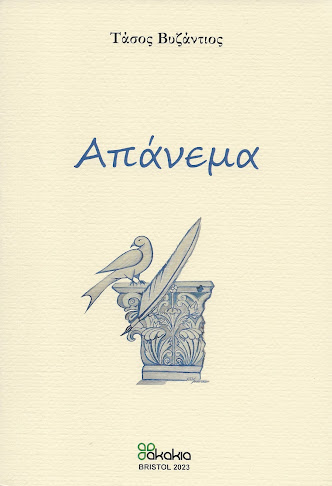H καταστροφή της
Σμύρνης στην Οξφόρδη
Mr
Eugenides and the burning of Smyrna, George Seferis and the Wasteland
This is the
title of a lecture given in Oxford on 15 February by Alicia Stallings, the
Professor of Poetry at Oxford University. She is an American classicist and
poet who has lived in Athens for the last 25 years and is married to the Greek
journalist, John Psaropoulos.
Unreal City
Under the brown
fog of a winter noon
Mr. Eugenides,
the Smyrna merchant
Unshaven, with a
pocket full of currants
C.i.f. London:
documents at sight,
Asked me in
demotic French
To luncheon at
the Cannon Street Hotel
Followed by a
weekend at the Metropole.
The Waste Land
TS Eliot (Part
III – The Fire Sermon 207 – 214)
The catastrophe in Smyrna took place in mid-September 1922:
Metropolitan Chrysostom was killed on the 9th and the fire started
on the 13th which was some three weeks before the publication of The
Waste Land by the eminent American poet, and adopted Englishman, TS Eliot. The
events in Smyrna were the main news item for weeks in the UK and America (as can
be seen on the background slide in the above photograph) and the first readers
of The Waste Land would have been aware of these events.
Smyrna had been
a prosperous cosmopolitan trading centre, but now over 300,000 refugees flooded
into it, waiting on the quayside in the hope of being evacuated by sea. Several
‘allied’ ships moored in the harbour refusing at first to intervene on the
grounds of neutrality. The concern of the western powers was the harm to trade.
The coincidence
of dates perhaps had even more resonance on their 100th anniversary
in 2022 by when The Waste Land had become a major work in British literature.
The same year also marked the centenary of the publication of James Joyce’s
Ulysees with its own strong Greek connections.
George Seferis
had been born in Smyrna in 1900 and left in 1914, never to return. He retained
a lifelong nostalgia for the nearby seaside village of Scala (now Urla) where
he spent his summers as a child, gazing out at the many ships.
Seferis first
visited London in 1924 when he was unaware of The Waste Land. The ‘brown fog’
in the above passage was shocking to a Greek and Seferis was inspired by it to
write his own poem ‘Fog – say it with a ukulele’, a poem in Greek to which he
gave a title in English. The ukulele reference is to a popular song of the time
written by Art Conrad.
There is no
adequate Greek word for a proper English fog. There is perhaps some assonance between
the Greek word ομίχλη and τσίχλα – a thrush. In his
famous poem Κίχλη Seferis uses the ancient Greek word
for thrush though, there, Thrush is the name of ship, not the bird, and the
poem is concerned with Elpenor from the Odyssey.
It was during a
thick fog, again in London, that Seferis first came across The Waste Land – in
a bookshop on Oxford Street in 1932; he said he tasted death that day in the
fog. Reading of the ships moored off Smyrna made him feel a strong nostalgia.
Also chiming with him was the reference Tiresias, the blind seer, in the
Odyssey. The following year Seferis embarked on his translation of The Waste
Land into Greek.
It was a liberal
translation in which he says he was striving, above all, to capture the emotion
of the original so that his poem is a very Greek poem. Alicia Stallings showed
several slides of the Seferis translation, highlighting particular words for
the benefit of her largely English audience, and gave a close analysis of
several of choices Seferis faced when translating particular words. The title
he rendered as Έρημη Χώρα and at the top of the title
page he set out prominently, almost as a sub-title, “1922” which is absent in
the original. The line ‘Unreal city’ (the first line in the quoted passage
above) he translated as ‘Ανύπαρχτη πολιτεία’, a
broader word than ‘πόλις’.
He used Σμυρνικός,
rather than Σμύρνα and perhaps saw in Μετροπόλ
a resonance with the hanged Archbishop Chrysostom.
Seferis worked
seven hours a day for many months on the translation and carried out extensive
research. The experience was perhaps a strong influence on him when he came to
write his own poem Κίχλη in 1946, during the civil war. This
features a communication with the dead, as was the case in The Waste Land, and Tiresias
reappears.
It will hopefully
be clear from this account that the lecture was a rich experience of great
literature, both English and Greek and a neat marrying up of the two.
The Professor of
Poetry at Oxford holds office for four years, having been elected by a vote of the
University’s graduates, and is required to deliver one public lecture each
term. Her inaugural lecture, “The Bat Poet: Poetry as Echolocation” in November
is now available on line at Professor
of Poetry | Faculty of English (ox.ac.uk) and no doubt the present lecture
will be available on this site shortly.
Richard
Devereux











































No comments:
Post a Comment